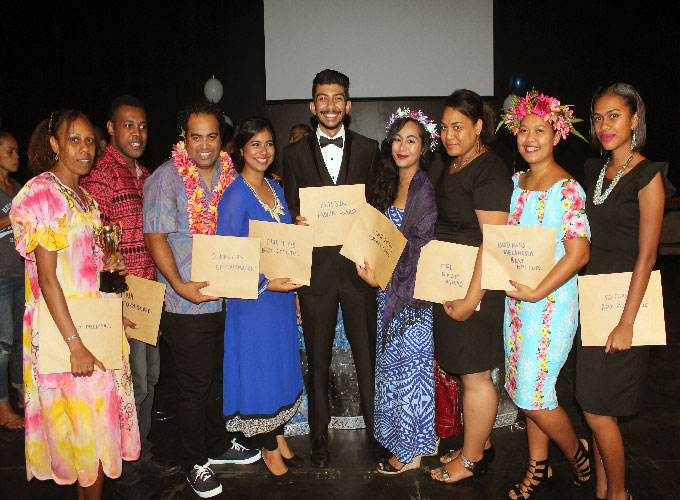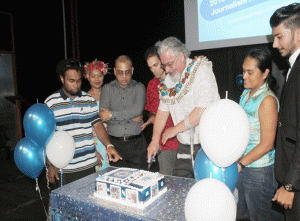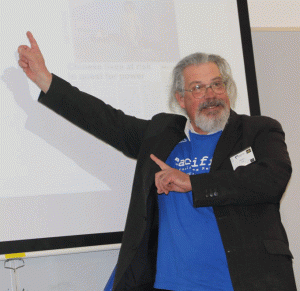
The University of the South Pacific hosted its annual journalism awards this month, honouring some of the top students who report for the journalism programmes multi-award winning student newspaper.
Wansolwara, USP’s training newspaper, was also commemorated for its 20th year of publishing.

Journalism student Chrisnrita Aumanu received the award of Best Wansolwara Editor, sponsored by Fiji publication Business Melanesia.
She told Asia Pacific Report that she enjoyed her role as student editor this year and was humbled to receive the award.
‘Challenging times’
“There would be challenging times, for example, running out of stories to put on the pages and looming deadlines. But at the end of the day when the challenges are dealt with, and with the great help from our tutors, it’s a great feeling.”
She said one of the successes for 2016 was this years first edition of the newspaper, when student journalists dedicated two-pages of the publication to TC Winston, the biggest cyclone ever to hit the Fiji islands.
Aumanu said being an editor has pushed her out of her comfort zone. Originally from the Solomon Islands, she hopes to bring her experience home to give back to her country.
She also acknowledged the team of student reporters and photographers who worked tirelessly on the newspaper this year.
‘Wansolwara’
“Wansolwara is a great news outlet, as it is a great platform for student journalists to put on paper what they have been taught in classrooms. Moreover, Wansolwara moulds budding journalists like us to write better stories each and every time with a sense of pride when we see our bylines.”
Another big winner of the night was former Wansolwara student editor, Sonal Singh, who won the Fiji Sun Tanoa Bowl Best Graduating Student Award.
‘Biggest success’
He told Asia Pacific Report, the award is his biggest success this year.
“Since 2014, when I first came to know about the awards, it became one of my goals to win the best graduating student award. I could say that my consistency brought me closer to this.”
“This awards means that I am on the right track.”
Singh said the biggest challenges for the year have been managing his role as the president of the USP Journalism Students Association (JSA), as well as a six-week attachment, and his commitment to Wansolwara.
“However through the understanding and help from family, friends and my lecturers, I was able to overcome my obstacles.”
‘Revived’
Singh, together with fellow journalism students have also successfully “revived” USP’s JSA by raising enough funds to improve the facilities in their newsroom.
Asia Pacific Report asked Singh what advice he would give to other aspiring Pacific journalists: “My advice would be that if you have the will and courage to stand and speak for what is right to improve our society, then become a journalist. It’s more exciting and satisfying than you think.”
Chief guest
The chief guest at the awards night was former USP lecturer Dr Philip Cass who founded Wansolwara in 1996 and now teaches at UNITEC in Auckland.

“Wansolwara has gotten more ambitious, covering issues from across the Pacific region,” Cass said in a statement featured in the Fiji Times.
“I think over the years, Wansolwara has become a lot better and has certainly won a lot of awards. This certainly has reflected the hard work done by my successors and all the staff who have worked on it over the years.
“This is a very special moment for me to think that it has survived this long and has prospered this much. I was very touched and I am very grateful for this invitation.”
Wansolwara is now the longest surviving student publication in the Pacific region and continues to cover serious news on a quarterly basis.
USP journalism coordinator Dr Shailendra Singh said the awards have been an important event in university’s journalism calendar, since it was introduced by the Pacific Media Centre’s Professor David Robie.
‘Well supported’
“The awards are well supported by the news media industry in Fiji who sponsor the prizes,” Dr Singh said.
“News media industry representatives attend the function and present the prizes in person, which is a boost for the future journalists of the region.”
Dr Singh said the need for well-trained journalists had increased with the onset of social media and citizen journalism, especially in the face of the ongoing development problems faced by the region.
‘Young journalists’
“It is very important to encourage potential young journalists by recognising, incentivising and rewarding good examples of journalism,” said Dr Singh.
“The awards have become an important occasion in the USP journalism calendar over the years, given USP’s critical role in nurturing the future journalists to meet the needs of the region.”
The USP Journalism Programme has produced more than 200 graduates. Many are now working in various media roles throughout the Pacific and beyond.













































